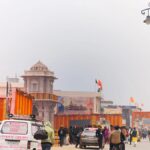The Delhi High Court dismissed a Public Interest Litigation (PIL) on Wednesday seeking the removal of the graves of Mohammad Maqbool Bhatt and Mohammad Afzal Guru from Tihar Central Jail. Instead, the court ordered the remains to be relocated to a confidential location to prevent what it termed “glorification of terrorism.”
The PIL was filed by the Hindu right-wing organization Vishwa Vedic Sanatan Sangh, which argued that the existence of these graves within the jail constitutes an “illegal, unconstitutional” act that is against public interest. The organization claimed that the graves have transformed the facility into a hub for “radical pilgrimage,” where extremist elements gather to honor convicted terrorists.
During the proceedings, the counsel for the petitioner asserted that the graves serve as a “nuisance” under Section 398 of the Delhi Municipal Corporation Act, citing concerns over individuals committing crimes to pay homage. The court contested this interpretation, questioning the definition of “nuisance.” Chief Justice DK Upadhyaya remarked, “Jail is not a public place. Jail is a place owned by the State, established for a specific purpose. Where is the question of any grave causing an offence?”
The division bench, which included Justice Tushar Rao Gedela, encouraged the petitioner to withdraw the plea with the option to refile it at a later date. The court noted there are established judgments that oppose glorification of terrorism and highlighted the sensitivity of the matter. Justice Upadhyaya stated, “Somebody’s last rites need to be respected,” emphasizing that prison rules necessitate such rites be conducted with solemnity.
The bench raised concerns about the timing of the petition after 12 years since the graves were established, asking for robust data to assess the situation appropriately. The justices pointed out that the focus of any new petition should be on preventing glorification rather than seeking removal of the graves.
The petitioners also referenced the burials of Ajmal Kasab and Yakub Memon, arguing those were conducted in ways that prevented glorification. The counsel noted, “Neither the Prison Act, 1894, nor the Rules provide for the burial of a terrorist or a convict inside the jail premises” but acknowledged that the graves exist.
Additionally, the petition claimed that the presence of these graves poses health risks, potentially leading to contagious diseases for both inmates and staff at Tihar Jail.
Afzal Guru was sentenced to death in December 2002 after being convicted of conspiracy in a 2001 attack on the Indian Parliament. His trial was conducted under the Prevention of Terrorism Act (POTA), which faced criticism for not meeting international fair trial standards and was repealed in 2004 due to widespread allegations of misuse. A coalition of activists, including Nandita Haksar and Arundhati Roy, argued that Guru’s trial suffered from serious flaws, including fabricated evidence and inadequate legal representation.
Maqbool Bhat was executed by the Indira Gandhi government on February 11, 1984, shortly following the assassination of Indian diplomat Ravindra Mhatre in the UK, which ignited significant unrest in Kashmir. Sentenced to death for the murder of a CID official in 1966, Bhat had escaped to Pakistan but was recaptured in 1976; his death sentence was upheld by the Supreme Court in 1978.
The article was first published by Maktoob Media.
Tags: Delhi HC, PIL, Maqbool Bhat, Afzal Guru, Tihar Jail
Hashtags: #Delhi #rejects #Hindu #wing #organisations #PIL #remove #graves #Maqbool #Bhat #Afzal #Guru #Tihar #Jail










